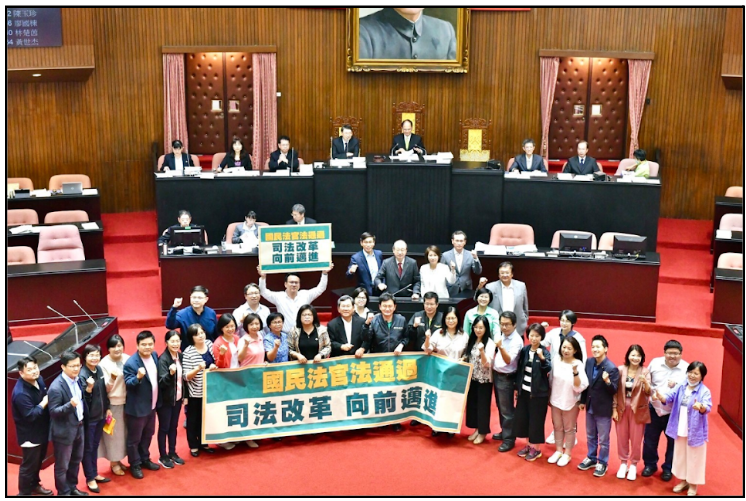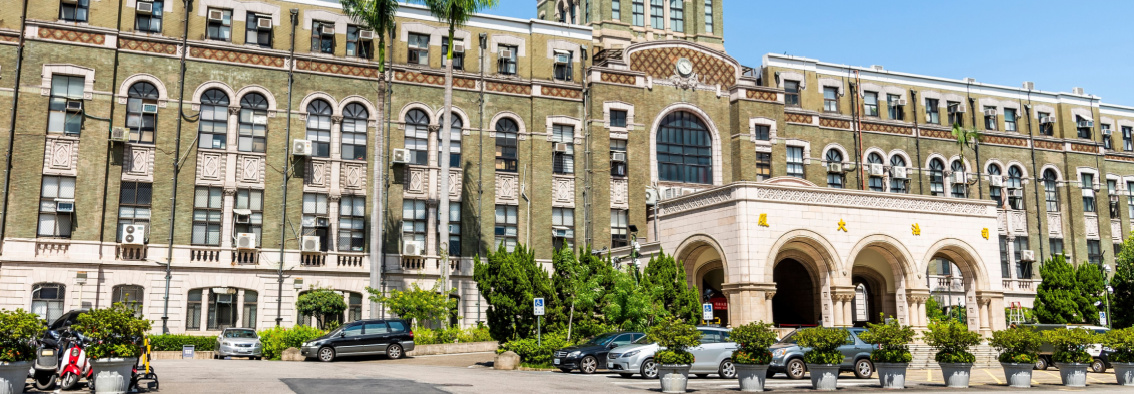In January of 2023, Taiwan began to implement the provisions of the Citizen Judge Act (CJA, 國民法官法), in accordance with legislation passed by the Legislative Yuan (立法院) in 2020. The new law will make for a fundamental change in the way that major criminal cases—particularly potential death penalty cases—are decided by the courts. Before 2023, a criminal case at the district level would have only been heard by three professional judges: a head judge and two supplementary judges. As provided for under the Citizen Judge Act, selected cases will now be adjudicated by a collaborative or mixed court system: one that retains the three appointed professional judges, but adds six lay judges—similar to the Japanese or German models of lay jurors—who are to be drawn from the general public.
For the next three years, these citizen judges will take part in cases in which the defendant is accused of intentionally committing a crime that caused the death of a person, and which therefore could potentially be punishable by death. A guilty verdict will require the support of six of the nine judges hearing a case, and therefore takes the sole power of decision away from the three professional judges. Following this initial three-year period, the current legislation calls for the system to be expanded: from January 1, 2026, citizen judges will take part in cases in which the defendant is accused of committing an offense punishable with a minimum prison sentence of more than 10 years.
From the enactment of this system, the Judicial Yuan (司法院) will have a six-year assessment period. The Judicial Yuan has been tasked with constructing a “Committee for the Assessment of the System of Civil Participation in Criminal Trials” (國民參與審判制度成效評估委員會), to be composed of 15 members. Each year the assessment committee is required to conduct research and submit an annual assessment report on the implementation of the system. During the assessment period, only 300 cases are to be heard under the lay judge system. After this, legislators have set a limit of around 0.19 percent of all cases per year (roughly 600 cases total) that will use the lay judge system.
In order to be eligible to serve as a lay judge, citizens must be over 23 years old, have finished the basic national education for their generation (the policy recognizes the minimum education required at the time of one’s birth), and must have lived in a court’s jurisdiction for at least four consecutive months. [1] Lay judges cannot be lawyers, soldiers, police officers, convicted criminals, or hold specific posts in government. Citizens may also be excused from service if they are a teacher, a student, over 70 years old, or have other compelling causes such as illness or business commitments.
The Theoretical Background of the Citizen Judge Act—and Concerns About Its Implementation
The Citizen Judge Act was written in an attempt to create a more transparent and democratic judicial system. Taiwan’s CJA is part of a greater international movement toward bringing lay judges or jurors into criminal court proceedings. As argued by Rieko Kage in Who Judges? Designing Jury Systems in Japan, East Asia, and Europe, these changes have been supported by political parties around the world shaped by “New Left”-oriented policies, which seek to increase direct political participation in democratic processes. [2] Direct political participation is also known as “deliberative democracy,” a political theory that emphasizes the need for public deliberation to justify laws and decisions. [3] In essence, deliberative democracy aims to create a more informed citizenry by requiring its citizens to defend their opinions. While such systems are by no means perfect, they are nevertheless seen by the public as more legitimate. [4]
Critics, however, argue that the same criticism can be heard about lay judge systems. Lay judges and professional judges will be disproportionately cognizant of court language and procedures. In this setting, lay judges must inevitably lean on the expertise and advice provided by the professional judges in order to form their own opinions. Despite the apparently greater presence of transparency and legitimacy in court proceedings, decisions will tend to reflect the views of elites or professional judges, thereby upholding existing hierarchies and biases.
In the past, the judicial system has served as a gatekeeper between the court and lay people. The official legal language used during trials tends to be complicated and convoluted, to the extent that only those who have studied law may be able to understand the proceedings. Prosecutors and defense lawyers will need to adapt to using more common language in the court, potentially posing challenges throughout the legal process. Due to this language gap, expectations of citizen judges have been lowered when it comes to their written verdicts. Professional judges write their verdicts in three parts; facts, evidence, and reasoning for their decision making. Citizen judges are not required to provide systematic reasoning in their written verdicts—and verdicts will thus be limited to the facts and evidence presented during the trial, without explanation of the court’s reasoning underlying a decision. The lay judge system—in an attempt to be more transparent to the public—could potentially become less transparent at this stage, as the public will not have access to the rationales underlying decisions. In turn, this could potentially impact the viability of appeals: if the written record lacks detailed reasoning, appellate courts may not be able to evaluate trial court decisions in a meaningful way.

Image: Legislators supportive of the Citizen Judge Act celebrate its passage in a publicity photo in the Legislative Yuan (July 22, 2020). (Image source: Website of Legislator Su Chiao-hui [蘇巧慧]).
Concerns Regarding Death Penalty Deliberations and Judicial Transparency
When determining the voting requirements for a defendant to be sentenced to death, the legislation has necessitated that a two-thirds vote (i.e., six out of nine judges) would be required for the punishment of death to be applied. Of the six judges who vote in favor of death, one must be a professional judge. Human rights experts, including former Vice President Annette Lu Hsiu-lien (呂秀蓮), have criticized this aspect of the policy, arguing that a unanimous vote (rather than the current requirement of a two-thirds majority) should be required given the seriousness of state-ordered execution. From this perspective, the death penalty should be handed down under only the most rigorous judicial procedures. A unanimous agreement confirms that there are no reservations regarding the ruling on the part of any of the judges involved.
According to Article 14 of the United Nations International Covenant on Civil and Political Rights (ICCPR), all individuals convicted of a crime have the right to have their conviction and sentence reviewed by a higher tribunal. Any person sentenced to death in Taiwan must go through an appeals process, and any limitations to this review would impose an unjust constraint on their right to a fair judicial review. Transparency in judicial decisions is particularly necessary for the due process safeguards that prevent the arbitrary deprivation of life, a standard outlined in Article 14 of the ICCPR.
Taiwan Alliance to End the Death Penalty (台灣廢除死刑推動聯盟), an NGO focused on the abolition of capital punishment in Taiwan, has presented concerns over the transparency of the new lay judge system in death penalty proceedings. The deliberation process for the judges takes place behind closed doors and is not recorded for future consultation. This confidentiality in the deliberations of lay judges has been justified on grounds that, if the deliberation process is made open to the public or defense lawyers, these closed-doors discussions will be released to the media—and could therefore taint the process. However, such opaque processes undermine the role of defense lawyers, as they are not engaged in the process—and therefore not allowed to ensure due process.
Prosecutors and defense lawyers are both unfamiliar and ill-equipped for a voir dire process by which citizen judges are selected. In the months and years following the act’s implementation, defense and prosecutors will likely raise concerns about the court procedures with the new judge system. Defense lawyers have spent their career learning how to present their cases strategically to professional judges; taking on a case that will be evaluated by lay judges will require more work and effort for defense lawyers—involving novel strategies of defense, and therefore additional layers of complication.
Moreover, the CJA does not call for government funding to cover the costs of trials with lay judges. This could discourage lawyers from taking on these challenging cases, as they lack the financial incentive to do so. In turn, this could bring the CJA into conflict with Article 14 of the ICCPR, which mandates that all individuals should have equal access to legal assistance whether they can pay for it or not. The responsibility of providing adequate funding for legal aid services thus falls on the government.
Conclusions
As the CJA is still in the early stages of implementation, it remains unclear whether the lay judge system will be a benefit or detriment to Taiwan’s society. Mock trials in Taiwan have so far revealed that sentencing is more lenient with the inclusion of citizens. However, these mock trials were under controlled conditions. When the lay judge system meets the unpredictability of the courtroom—in an environment wherein both prosecutors and defense lawyers are inexperienced with the new system—due process may be in danger. Over the course of the next three years, as citizens and observers, we must closely monitor this new judicial process before we make definitive conclusions.
The main point: The recent enactment of the new Citizen Judge Act in Taiwan will place lay judges, drawn from Taiwan society, onto the panels of judges that decide major criminal cases. Many aspects of this law leave concern for proper due process in death penalty cases.
[1] In most cases, the educational provisions will require that citizen judges possess a high school diploma. However, some more elderly citizens in Taiwan might only have an education up to sixth grade, as this was the minimum standard for basic education during their earlier life. The Citizen Judge Act accounts for this in its language regarding standards for “basic national education” of a person’s generation.
[2] Rieko Kage, Who Judges?: Designing Jury Systems in Japan, East Asia, and Europe (Cambridge: Cambridge University Press, 2017).
[3] Joshua Cohen, “Deliberation and Democratic Legitimacy,” in Alan Hamlin and Philip Pettit (eds.), The Good Polity 15 (1989).
[4] Zachary Corey and Valerie P. Hans, “Japan’s New Lay Judge System: Deliberative Democracy in Action?,” APLPJ 12 (2010): 72.



